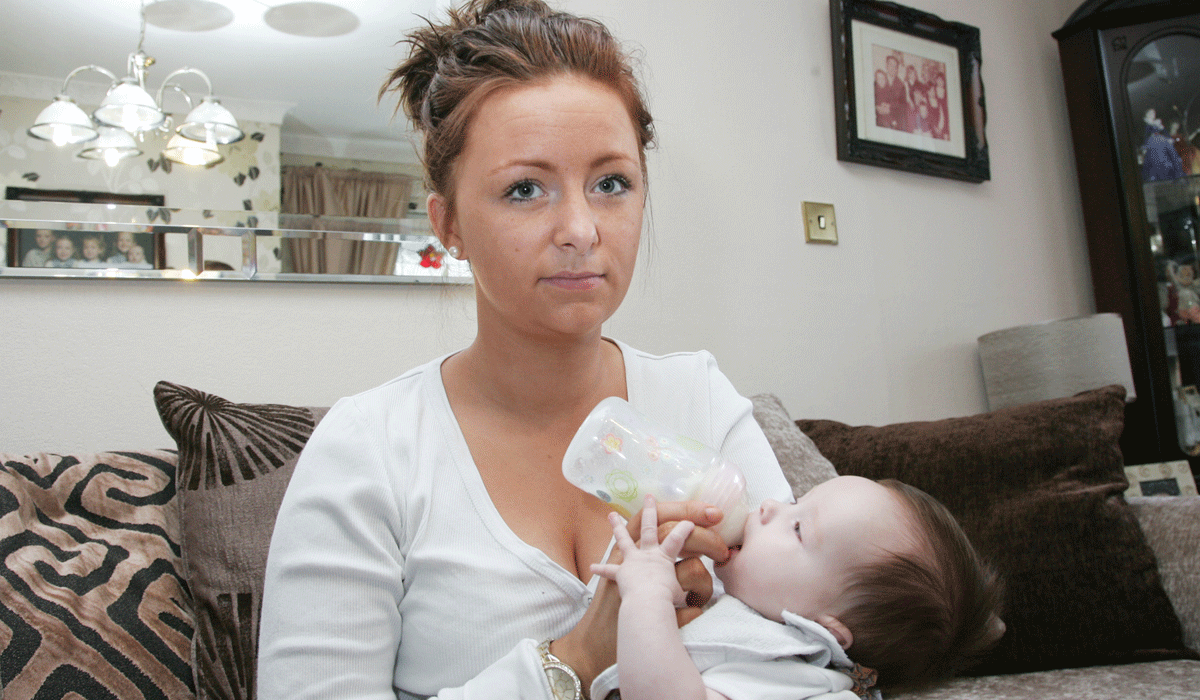A YOUNG local mother has hit out after her sick baby was sent to Craigavon for urgent treatment after a seven-hour wait in the RVH’s A&E department.And Mary McNulty says staff at the A&E department of the Royal Belfast Hospital for Sick Children urged her to make an official complaint about a lack of beds at the facility as it was the “only way” that hospital bosses would sit up and take notice of the problem.
The Woodside Drive woman was urged by medical staff to complain after her three-month-old baby Kelcie could not be admitted for treatment for complications resulting from a severe bout of bronchitis due to the lack of beds. After a seven-hour wait at the hospital’s A&E unit, the young mother was told her baby would have to be taken for treatment 30 miles away to Craigavon Area Hospital where medical staff found that the oxygen levels in little Kelcie’s lungs were dangerously low.
Mary says her child, who has since been released from hospital, could have died had she been made to wait for treatment any longer at the A&E unit and is now calling on the Belfast Health Trust toaddress the problem before a life is lost.
“Kelcie had been suffering from a bronchitis for a few weeks but when she stopped taking her food and started having coughing fits I took her to casualty at the children’s hospital,” said Mary.
“I went in at 5pm on the Sunday and it was packed. They examined Kelcie and told me she was dehydrated and would be seen in two hours. Five hours later they sucked fluid out of her nose so she could try and take a bottle feed again and I was sent out into the waiting room to feed her.”
Returning to a still-crowded waiting room with no seating, Mary had to take little Kelcie to benches outside the building to feed her.
“I was surrounded by people smoking cigarettes, which wasn’t an ideal place for a baby with breathing problems to be,” she said.
“By this stage it was midnight and my mother had to stand inside in case we were called. When we were eventually called they [A&E staff] said it was just her bronchitis and to keep persevering with the feeding and she would get better. But when Kelcie brought her bottle back up again they decided to admit her.”
However, a lack of beds at the Children’s Hospital meant Mary was told little Kelcie had to be treated elsewhere.
“I said I was going to complain as she was seriously ill and needed treatment now,” said Mary.
Incorrectly
“They agreed with me and said I should definitely make a complaint as they badly needed more beds. They said it was the only way to get more beds as ‘they [hospital bosses] don’t listen to us’.”
On arrival at Craigavon Area Hospital at 2am, Mary learned that her child’s name had been registered incorrectly by medical staff.
“They had her down as ‘Cassie’ instead of Kelcie,” explained Mary.
“She was then put into an incubator and tests were carried out on her breathing. They found her oxygen levels had dropped to 70. If it dropped any lower she could have had brain damage. She could have died, yet the Royal were prepared to send me home and put it down to bronchitis. She ended up staying in hospital for four days.”
Mary said she understood the pressure medical staff are currently under at the Royal Belfast Hospital for Sick Children’s A&E department since the closure of Belfast City Hospital’s A&E unit in November last year.
“They obviously can’t cope,” she said, “that’s clear for everybody to see.”
A spokesperson for the Belfast Trust said: “If a patient needs hospital admission and a suitable bed is not available, we work as part of a network with colleagues in other hospitals, and while it is not ideal to admit a small child to a hospital some distance from Belfast, our aim is to ensure a safe outcome for the patient.
“The Belfast Trust is one of the largest health providers in Europe with over 17,000 staff. We have systems not only to encourage and facilitate staff to make their voices heard, but also to keep them informed of developments within the Trust.
“These include an intranet site, team meetings, a whistle-blowing mechanism and an annual staff survey. In fact, staff are actively encouraged to bring forward not only concerns, but also ideas on how we can improve outcomes for patients.”






